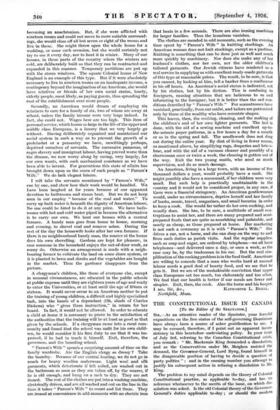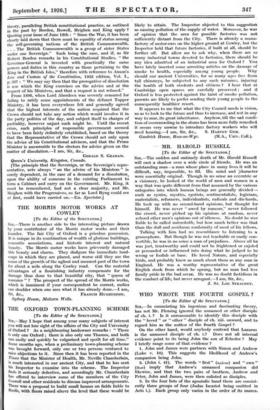THE CONSTITUTIONAL ISSUE IN CANADA
[To the Editor of the SPECTATOR.] Sat,—As an attentive reader of the Spectator, your forceful expositions on the free status of the self-governing Dominions have always been a source of sober gratification to me. I may be excused, therefore, if I point out an apparent incon- sistency in this heretofore undeviating policy. In your issue of July 3rd, referring to the Canadian Constitutional crisis, you remark : "Mr. Mackenzie King demanded a dissolution, and as the Conservatives under Mr. Meighen resisted the demand, the Governor-General, Lord Byng, found himself in the disagreeable position of having to decide a question of party politics " ; and in the ensuing number you attempt to justify his subsequent action in refusing a dissolution to Mr- King. The problem to my mind depends on the theory of Colonial Constitutional practice, as applicable to-day, and has no reference whatsoever to the merits of the issue, on which dis- solution was asked. Is the old Colonial theory of the GOVerII0T- General's duties applicable to-day ; or should the modem
theory, paralleling British constitutional practice, as outlined in the past by Borden, Rowell, Meighen and King apply ? Quoting your issue of June 12th: "Since the War, it has been clearly laid down that there must be equality of status among the self-governing nations of the British Commonwealth.
. The British Commonwealth Is a group of sister States under one Sovereign." Such being the case, and if, as Sir Robert Borden remarks in his Constitutional- Studies, "the Governor-General is invested with practically the sante powers and duties in this country as those pertaining to the King in the British Isles," therefore with reference to Anson's Law and Custom of the Constitution, 1922 edition, Vol. I.,
p. 327: "We may say then that the prerogative of dissolution is one which the King exercises on the advice and at the request of his Ministers, and that a request is not refused."
From 1896, when Lord Aberdeen was severely censured for failing to ratify some appointments of the defunct Tupper Ministry, it has been everywhere felt and generally agreed that the highest interests of the nation required that the Crown should not take any action which would involve it in the party politics of the day, and subject itself to charges of partiality, however unjust such might be. Until the recent crisis, such principles of responsible government seemed to have been fairly definitely established, based on the theory that the Representative of the Crown should act only upon the advice of his Constitutional advisers, and that the Prime Minister is answerable to the electors for advice given on the matter of dissolution.—! am, Sir, &c., [The principle that the Sovereign, or the Sovereign's repre- sentative, acts always "on the advice of his Ministers" is surely dependent, in the case of a demand for a dissolution, upon the ability of someone in the existing Parliament to form a Cabinet and carry on the Government. Mr. King, it must be remembered, had not a clear majority, and Mr. Meighen with the Progressives, so far as Lord BYng could see at first, could have carried on.—En. Spectator.]



































 Previous page
Previous page